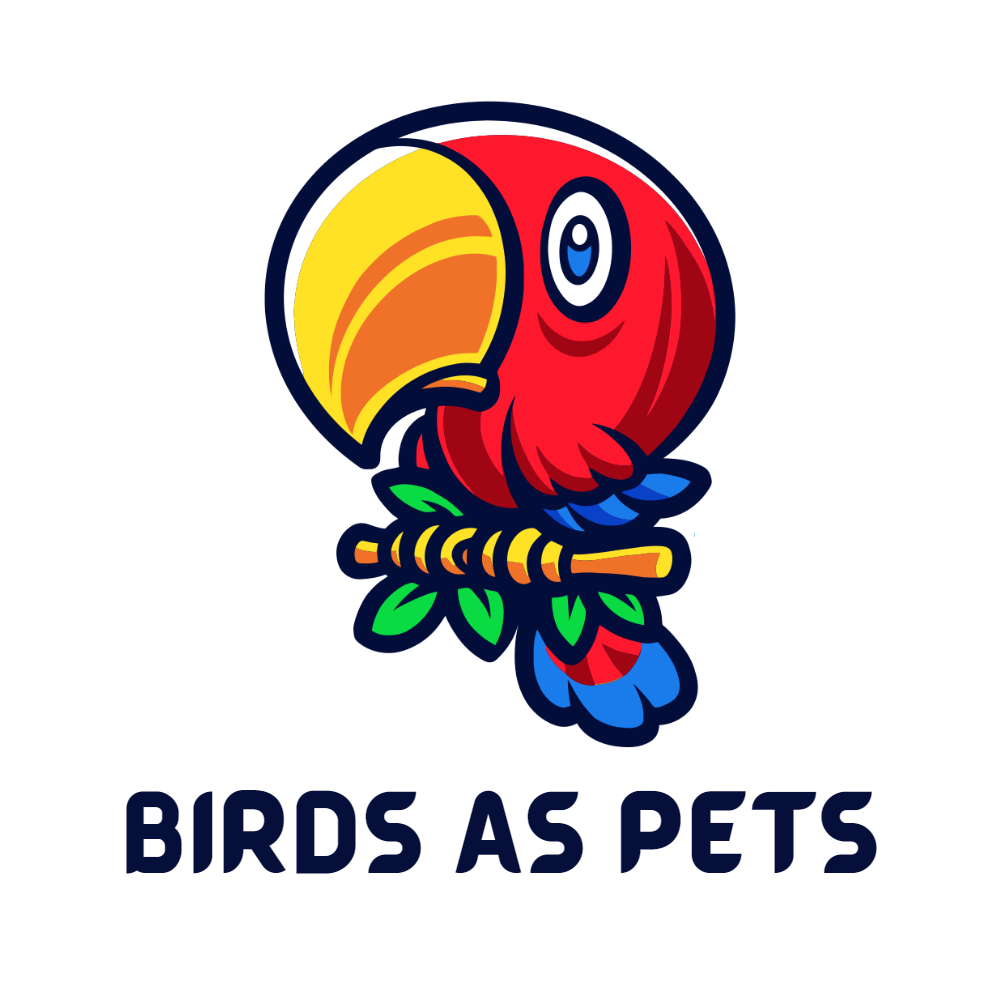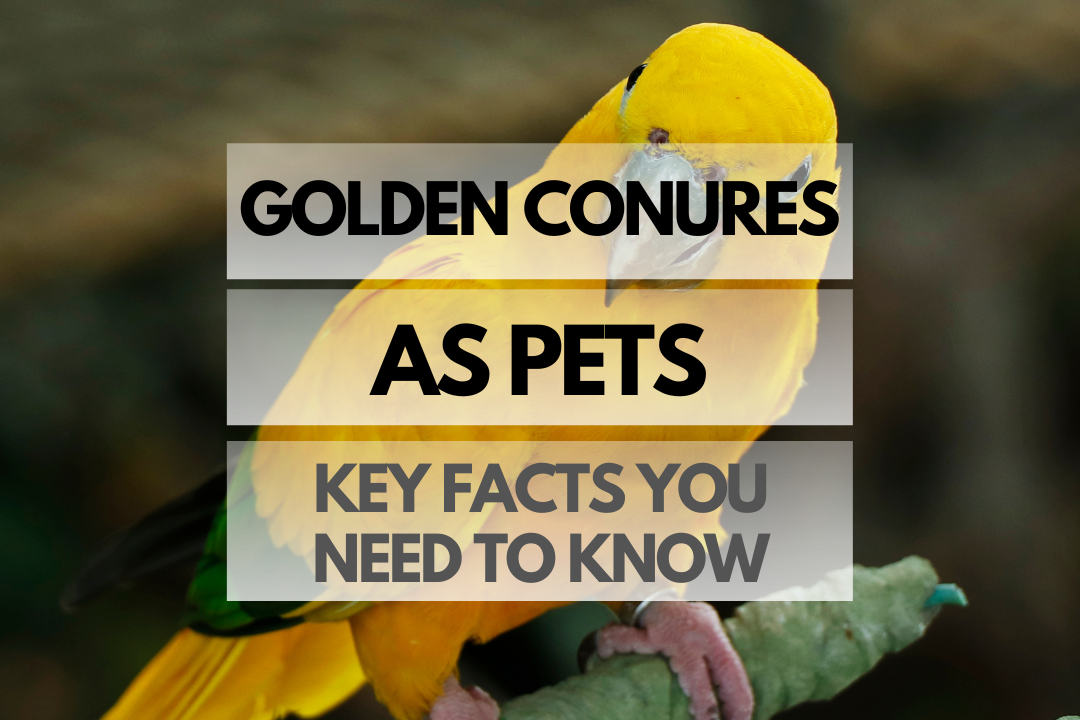Golden Conures, also known as Queen of Bavaria Conures, are vibrant, playful, and intelligent birds that can make wonderful pets for the right household. This article will provide you with all the essential information you need to decide if a Golden Conure is the right bird for you.
Quick Reference Table: Golden Conures Facts
| Fact | Details |
|---|---|
| Scientific Name | Guaruba guarouba |
| Size | Approximately 13-14 inches (33-35 cm) in length |
| Weight | 8-9 ounces (230-260 grams) |
| Lifespan | 20-30 years in captivity |
| Color | Bright yellow with green wingtips |
| Talking Ability | Moderate; can learn to mimic words and phrases |
Where Do Wild Golden Conures Live?
Wild Golden Conures are native to the Amazon rainforests of Brazil, where they inhabit dense forests and woodland areas. They are social birds that live in flocks and are known for their striking yellow plumage and playful behavior.
Golden Conures Lifespan: How Long Do They Live as Pets?
Golden Conures can live for 20-30 years or more in captivity with proper care. This long lifespan means that owning a Golden Conure is a significant time commitment, and prospective owners should be prepared for the responsibility of caring for their bird throughout its life. Providing a healthy diet, a clean and safe living environment, and regular veterinary care can help ensure a long and happy life for your Golden Conure.
Are Golden Conures Good Pets?
Golden Conures can make excellent pets for those who are prepared to meet their specific needs. They are intelligent, social, and affectionate birds that form strong bonds with their owners. Their playful nature and moderate talking abilities can make them entertaining companions. However, they do require a considerable amount of attention, mental stimulation, and social interaction to thrive, making them better suited for dedicated and experienced bird owners.
Are Golden Conures as Pets Good for Beginners?
Golden Conures may not be the ideal choice for beginner bird owners due to their specific care requirements and need for social interaction. They are better suited for those with experience caring for parrots or other large birds who are familiar with their unique needs and able to dedicate time and attention to their care.
Are Golden Conures Easy to Care For?
Golden Conures are relatively easy to care for in terms of their basic needs, such as diet and housing. However, they require a significant amount of social interaction and mental stimulation to stay happy and healthy. Prospective owners should be prepared to spend time each day playing with and interacting with their bird, as well as providing a variety of toys and enrichment activities to prevent boredom.
Golden Conures Pros and Cons
| Pros | Cons |
|---|---|
| Intelligent and playful | Can be noisy |
| Affectionate and bond closely with owners | Require significant time and attention |
| Moderate talking ability | Not ideal for beginners |
| Social and enjoy human interaction | Can be expensive to purchase and maintain |
Golden Conures Price and Costs
The cost of purchasing a Golden Conure can range from $2,000 to $3,500, depending on factors such as age, health, and availability. In addition to the initial purchase price, owners should also consider the costs of housing, food, toys, and routine veterinary care. These ongoing expenses can add up over time, so it’s important to budget accordingly.
Where to Buy Golden ConuresWhen looking to purchase a Golden Conure, it’s important to find a reputable breeder or rescue organization. Reputable breeders will have healthy, well-socialized birds and can provide you with information on the bird’s history and care requirements. Rescue organizations may also have Golden Conures available for adoption, offering you the opportunity to give a bird in need a loving home.
Caring for Golden Conures
Proper care for a Golden Conure involves providing a balanced diet, a clean and spacious living environment, and regular social interaction and mental stimulation. It’s essential to be prepared to dedicate time and effort to meet your bird’s needs to ensure its health and happiness.
Golden Conures Food
A well-balanced diet for Golden Conures should include a high-quality pelleted bird food, fresh fruits and vegetables, and a small amount of seeds and nuts. Providing a variety of foods will help ensure your bird receives the necessary nutrients and prevent dietary boredom. It’s also important to provide fresh water daily and monitor your bird’s food intake to ensure it is eating well.
Health and Common Issues
Golden Conures, like all birds, can be susceptible to certain health issues. Some common health problems include feather plucking due to stress or boredom, respiratory infections, and digestive issues. Regular veterinary checkups, a balanced diet, and a clean living environment can help prevent many of these issues.
Signs of Healthy Golden Conures vs. a Sick One
| Healthy Golden Conure | Sick Golden Conure |
|---|---|
| Bright, clear eyes | Discharge or cloudiness in the eyes |
| Glossy, well-groomed feathers | Ruffled, dull, or plucked feathers |
| Active and alert | Lethargic or unresponsive |
| Consistent eating habits | Changes in appetite or weight loss |
| Normal droppings | Changes in droppings, such as unusual color, consistency, or frequency |
Golden Conures Pet Insurance
Insuring your Golden Conure can help cover unexpected veterinary costs and provide peace of mind. Some pet insurance companies that offer coverage for birds include:
- Nationwide Pet Insurance
- Pet Assure
- Exotic Direct
- Petplan
Personality and Behavior
Golden Conures are known for their playful, affectionate, and intelligent personalities. They tend to form strong bonds with their owners and enjoy spending time with them. These birds are also curious and can be quite mischievous, often using their beaks and feet to explore their surroundings and manipulate objects. They require mental stimulation and social interaction to stay happy and healthy.
Are Golden Conures Social?
Yes, Golden Conures are highly social birds that thrive on companionship and interaction. In the wild, they live in flocks, and in captivity, they enjoy being around their human family members and other birds. It’s essential to provide regular social interaction and mental stimulation to prevent boredom and stress, which can lead to behavioral problems and health issues.
Speech and Noise of Golden Conures
Golden Conures have moderate talking abilities and can learn to mimic words, phrases, and sounds with practice. While they may not be the most skilled talkers among parrot species, they can still be quite chatty and entertaining. These birds can also be quite loud, making various vocalizations, including squawks and screeches, which potential owners should consider if noise is a concern.
Similar Species to Golden Conures
There are several parrot species with similar characteristics to Golden Conures, including:
- Sun Conures
- Jenday Conures
- Nanday Conures
- Green-cheeked Conures
Can Golden Conures Live With Other Pets and Birds?
Golden Conures can live with other birds, particularly other conure species, as long as they are introduced gradually and have enough space to coexist peacefully. However, it’s important to monitor interactions closely and separate birds if aggression or other issues arise. It’s generally not recommended to house Golden Conures with very small birds, as they may accidentally injure them. As for other pets, such as dogs and cats, it’s essential to supervise interactions closely and keep your bird safely contained when not under direct supervision.
Are Golden Conures Legal to Have as Pets?
Golden Conures are legal to own as pets in most areas, but it’s essential to check local laws and regulations before acquiring one. These birds are listed as an endangered species under CITES (the Convention on International Trade in Endangered Species of Wild Fauna and Flora), which means that there may be restrictions on their trade and ownership in some areas.
Additional Resources
Here are some helpful resources for learning more about Golden Conures and their care:
- Books: “Conures: A Guide to Caring for Your Conure” by Anne C. Watkins
- Forums: Avian Avenue Parrot Forum (https://forums.avianavenue.com/)
- Facebook Groups: Golden Conure Owners Group (https://www.facebook.com/groups/1571739173105136/)
- Scientific Articles: BirdLife International’s Golden Conure Species Profile (http://datazone.birdlife.org/species/factsheet/golden-parakeet-guaruba-guarouba)
FAQ for Golden Conures as Pets
Do Golden Conures talk?
Golden Conures have moderate talking abilities and can learn to mimic words, phrases, and sounds with practice. While they may not be the most skilled talkers among parrot species, they can still be quite chatty and entertaining.
Are Golden Conures suitable for families with young kids?
Golden Conures can be suitable for families with young kids if the children are taught how to interact with the bird safely and respectfully. However, these birds can be sensitive tonoise and stress, so it’s important to provide a quiet, calm environment and closely supervise interactions between children and the bird.
Can Golden Conures be trained?
Yes, Golden Conures are intelligent and can be trained to perform various tricks and behaviors, such as stepping up onto a hand, targeting objects, and performing simple tasks. Positive reinforcement training methods, such as clicker training, are effective and help build a strong bond between the bird and its owner.
How do I know what gender Golden Conures are?
Golden Conures are not sexually dimorphic, meaning that males and females have similar physical appearances. To determine the gender of your Golden Conure, you will need to consult a veterinarian who can perform DNA sexing or a surgical sexing procedure.
How long do Golden Conures live?
With proper care, a Golden Conure can live up to 25-30 years. Their lifespan depends on various factors, including diet, exercise, mental stimulation, and overall health care.
What is the best diet for Golden Conures?
A balanced diet is crucial for a Golden Conure’s health. A high-quality pellet-based diet should be the foundation, supplemented with fresh fruits, vegetables, and occasional treats. Avoid feeding them high-fat or high-sugar foods, and always consult your avian veterinarian for specific dietary recommendations.

